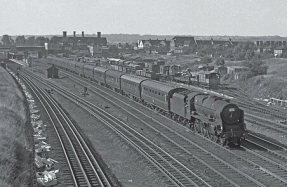
Part one
Both the late Lord Richard Beeching and the late Baron Ernest Marples, who was this Country’s Minister of Transport from 1959-1964 and as such was Dr Beeching’s boss, have often, over the last six decades, been cast as the joint nemesis of the UK’s railway system. However, at this distance in time and upon considered reflection, is that opinion of both Beeching and Marples correct or fair? Put another Way, the essential question for me is, ‘Did the Beeching Report effectively initiated by Ernest Marples - do nothing more than articulate how the systematic destruction of the UK’s railway system would be achieved, or did it help to facilitate the birth and growth of UK’s 21st Century Economy?” This article seeks to address that question.
Background
Understandably, to say the least, much has been written about how Dr. Richard Beeching and his The Reshaping of British Railways report of 1963 totally changed the shape and character of Britain’s railways. However, much less has been published about the real two senior political masterminds who appointed Beeching as British Railways’ (BR) first Chairman and then subsequently encouraged him in taking a very aggressive approach to the reshaping of the system. The two men to whom I refer are the then Prime Minister, Harold Macmillan, and Ernest Marples. I think it is worth recounting the political and economic imperatives that drove not only Beeching’s appointment, but also of equal if not more importance the appointment of Marples in the first instance.
By the lata 1950s/early 1960s British Railways was operating with a massive annual operations deficit, that continued to significantly increase out of control year on year. It went from £68 million in 1960 to £87 million in 1961, and £104 million in 1962 (which in today’s money would be north of £2 billion). To step back slightly in time, it had been thought by Government in the mid-1950s that the £1.2 billion granted as a loan to British Railways, arising from the 1955 Railway Modernisation Plan, would produce an efficient and economically viable railway. However as the figures show, the spiralling railway deficit was clearly nowhere near being under control. The political and media pressure on the Government ‘To do something about the Railways’ was, once the 1959 General Election had been won, no longer avoidable for Harold Macmillan and he knew it!
Harold Macmillan enjoyed the public reputation of being a highly intelligent ‘Old School Gent’, with all the associated measured and languid approach to life and politics that one might associate with someone from this background. While this impression of Macmillan is true to a point - and maybe one he encouraged himself as part of his public persona - it also does him a grave disservice. In truth Macmillan was also a highly effective politician, who in addition to the aforementioned qualities, was also a very shrewd, wily and determined operator. What isn’t also too widely known is that Macmillan had an informed insider’s view of UK railways, because he served for many years until Nationalisation as a Director of the Great Western Railway,, enjoying to his closing days the Gold Pass that as a former Director he was rightly entitled to.
Macmillan was always keen, like all effective politicians, to not only keep abreast of public taste and opinion, but also where desirable and possible inform them to gain and maintain political ascendency. As such he was swift






